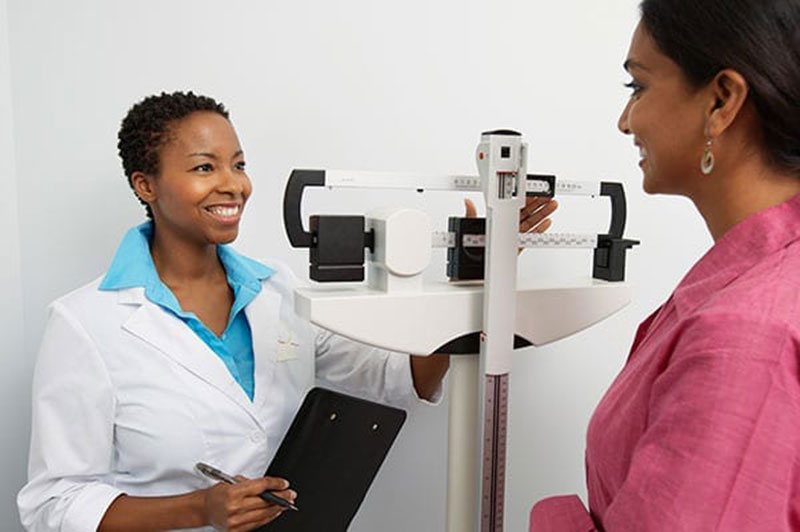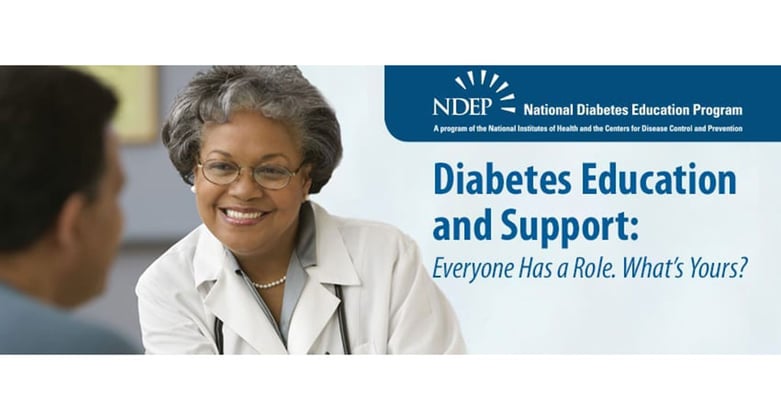November is National Diabetes Awareness Month, a time to shed light on the disease and educate the public and health care professionals about proper treatment and disease management.
In support of National Diabetes Awareness Month, the UMHS Endeavour looks at diabetes education for future doctors at American and Caribbean medical schools. We will include information from NDEP (National Diabetes Education Program), a program of the National Institutes of Health and the Centers for Disease Control and Prevention (CDC) at http://ndep.nih.gov/index.aspx
Highlights of diabetes screening and treatment plans in valuable online publications for medical professionals (links provided) are included in this post.

PREDIABETES & DIABETES SCREENING: Knowing who to screen is key, NDEP says. Photo: NDEP.org
Caring for Diabetic Patients
Proper health care for diabetic patients is crucial because, as NDEP points out, education is key to keeping diabetics healthy.
NDEP says more than 29 million Americans have diabetes. “It is estimated that one in every four people with diabetes does not even know they have the disease,” NDEP says in a press release. “If left undiagnosed or untreated, diabetes can lead to serious health problems, including heart attack and stroke.”
Diabetes education is needed at all times and not simply at the time of diagnosis, NDEP says, noting that a network of support helps diabetics “better cope with the day-to-day demands of living with diabetes.”
Diabetes HealthSense: One-Stop Resource for Health Care Professionals
Health care professionals play a huge role regarding diabetes education and support.
The NDEP offers many resources that you can use to support people with diabetes in your community. Below are samples.
The NDEP website’s Diabetes HealthSense page is a particularly useful resource for doctors, physician assistants, nurses and nurse practitioners treating diabetic patients. Diabetes HealthSense is “an online library that provides easy access to more than 160 resources from more than 80 organizations that support people with diabetes, people at risk for the disease, and those who care for them in making changes to live well or facilitating behavior change in others.”
As the website eloquently puts it, “When patients are successful at making changes in their behaviors, health outcomes improve.” Besides providing valuable access to research articles, Diabetes HealthSense assists medical professionals with setting goals for diabetic patients.

TALKING WITH PATIENTS: 'Guiding Principles for Diabetes Care' offers help for professionals with patients & disease management. Photo: NDEP.org
The online publication Guiding Principles for Diabetes Care offers care for both patients living with diabetes and those at risk for developing the disease.
Medical professionals will receive help with the following:
- Identify Undiagnosed Diabetes and Prediabetes
- Manage Prediabetes
- Provide Self-Management Education and Support
- Provide Individualized Nutrition Therapy
- Encourage Regular Physical Activity
- Control Blood Glucose
- Reduce Cardiovascular Disease Risk
- Detect and Monitor Microvascular Complications
- Consider Special Populations
- Provide Patient-Centered Care
Another online publication, GAME PLAN for Preventing Type 2 Diabetes: A Toolkit for Health Care Professionals and Teams.
The following areas are covered for medical professionals:
- Prediabetes Screening: How and Why
- How to Talk with Patients
- Help Your Patients Make Lifestyle Changes
- Reimbursement and Coding
- Facts and Statistics
- Related Resources
Prediabetes and diabetes screening is particularly useful in health care settings, the publication says. Information is included for testing asymptomatic, high-risk patients to ascertain whether they could have either prediabetes or type 2 diabetes, with screening recommendations by the American Diabetes Association and the United States Preventive Services Task force. All groups “advise the use of one or more blood tests to determine the degree of blood glucose elevation,” GAME PLAN says.
“The process used to target and test patients may include a team approach, employing various health care professionals such as medical assistants, nurses, physicians, diabetes educators, or others,” the publication says. ”Electronic health records can alert health care team members about patients who should be targeted for diabetes screening, either during or between visits to the clinic. Health care providers in a variety of practice settings can consider use of standard ordering protocols for glucose testing, which may be approved by physicians up front but carried out by other team members when at-risk patients are identified. In addition, provider teams can look for opportunities to screen for prediabetes while managing a patient’s other conditions. For example, when screening for hyperlipidemia, a fasting glucose may easily be added to a standard fasting lipid test panel.”
Medical professionals and medical students can find more information online at www.YourDiabetesInfo.org/DiabetesMonth2015.
About UMHS:
Built in the tradition of the best US universities, the University of Medicine and Health Sciencesfocuses on individual student attention, maintaining small class sizes and recruiting high-quality faculty. We call this unique approach, “personalized medical education,” and it’s what has led to our unprecedented 96% student retention rate, and outstanding residency placements across the US and Canada.

Scott is Director of Digital Content & Alumni Communications Liaison at UMHS and editor of the UMHS Endeavour blog. When he's not writing about UMHS students, faculty, events, public health, alumni and UMHS research, he writes and edits Broadway theater reviews for a website he publishes in New York City, StageZine.com.















